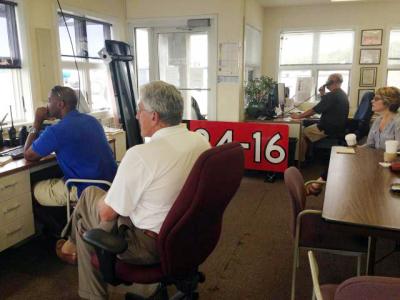After Curfew No East Hampton Airport Logjam

The East Hampton Airport was busy, but not overly so, on Monday morning after the first weekend of an overnight curfew on flights — a holiday weekend to boot.
The decision by East Hampton Town, which owns the airport, to close the airport overnight in response to complaints about aircraft noise was challenged in federal court, but a judge's ruling paved the way for the nighttime closures, which took effect on July 2. The new rules prompted an outcry from aviation businesses and other opponents, but did not seem to cause much turbulence at the airport, at least in their first few days.
Late morning on Monday, Jemille Charlton, the airport manager, summed up: "It was very smooth; uneventful."
Supervisor Larry Cantwell and Councilwoman Kathee Burke-Gonzalez, the town board's airport liaison, were in the operations center overlooking the tarmac at 9 a.m. Monday as the curfew on flights by "noisy" aircraft was about to be lifted. A half-dozen or so seaplanes stood waiting for passengers, their pilots performing pre-flight checks. There was no queue of helicopters waiting to take off, nor any circling in a holding pattern, waiting for the magic hour when they could land.
A few minutes after 9, a couple of helicopters took off. The morning "rush" was over, and the tarmac virtually clear, by 9:45.
Data on the exact number of takeoffs and landings over the long weekend had not yet been compiled, but traffic was "pretty on par for a Fourth of July weekend," said Mr. Charlton. On Sunday, he said, there was "a steady flow." And at 7 a.m. Monday, as the overnight curfew expired for less noisy aircraft, Mr. Charlton said that "there wasn't any big, 'All right, the light switch went on ... curfew's ended; let's get in there!' "
He did notice over the weekend, though, that some pilots with flights scheduled close to curfew hours seemed to be feeling the pinch of the restriction. "You can see their anxiety goes up," Mr. Charlton said, "40 minutes before they have to leave, and their passengers haven't arrived yet."
Aircraft that are rated "noisy," based on a decibel measure used by the F.A.A. and including many helicopters, can no longer take off or land here between 8 p.m. and 9 a.m. For aircraft that fall below the noise threshold, the curfew is 11 p.m. to 7 a.m.
There had been some concern, Ms. Burke-Gonzalez said, that quieter helicopters not subject to the extended curfew would depart East Hampton as soon as possible, at 7 in the morning, fly to New York City, and zoom back to the airport to pick up more passengers just at 9. That could create a traffic jam, with choppers wanting to land just as aircraft waiting for the 9 a.m. all-clear were ready to take off. But that didn't happen.
Aviators got word of the curfew in several ways, Mr. Charlton said. The Federal Aviation Administration's flight safety district office was notified; a notice was sent to area airports; some pilots were contacted by email, and the airport's fixed-base operators — the aviation businesses based there — informed their customers.
The Eastern Region Helicopter Council, a trade group, was "very instrumental" in getting the message out to its members, said the airport manager. And, he said, an alert about flight restrictions is included in the airport information for pilots, so that those doing their "due diligence" will be advised to check with the airport office.
Jeff Smith, the chairman of the helicopter council, sat down at a table in the airport operations center on Monday morning. He was back and forth from his home base in New Jersey several times over the weekend, he said, monitoring how things were going at the airport, "to see how we could do better." He echoed Mr. Charlton's assessment that it had largely been smooth sailing.
Information about noise complaints prompted by aircraft flying within the designated hours over the holiday weekend was still being compiled early Monday. But Mr. Charlton said he "did get a lot of voicemails from people who are pretty agitated at the traffic."
Those affected by noise, who had anticipated the impact of another law adopted by the town -- a one-round-trip-per-week limit on noisy aircraft -- were disappointed by Judge Joanne Seybert's decision to enjoin the implementation of that rule and were perhaps, Mr. Charlton suggested, expressing more aggravation than usual about the daylong air traffic.
Judge Seybert, of Federal District Court in Central Islip, ruled on June 26 that the overnight curfew was justified, to control noise, but ruled that the plaintiffs -- a group of aviation companies, along with an organization called Friends of the East Hampton Airport — had shown their businesses could be harmed if the once-a-week limit was enacted.
The lawsuit will now go to trial, and it could be a long time before the ultimate outcome is determined.
